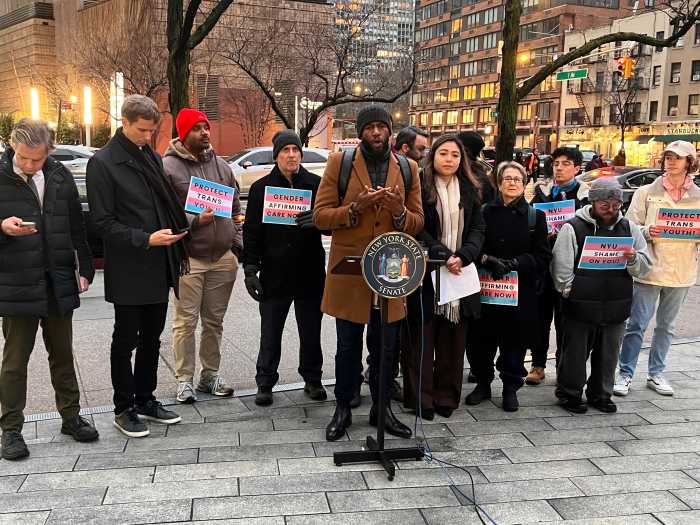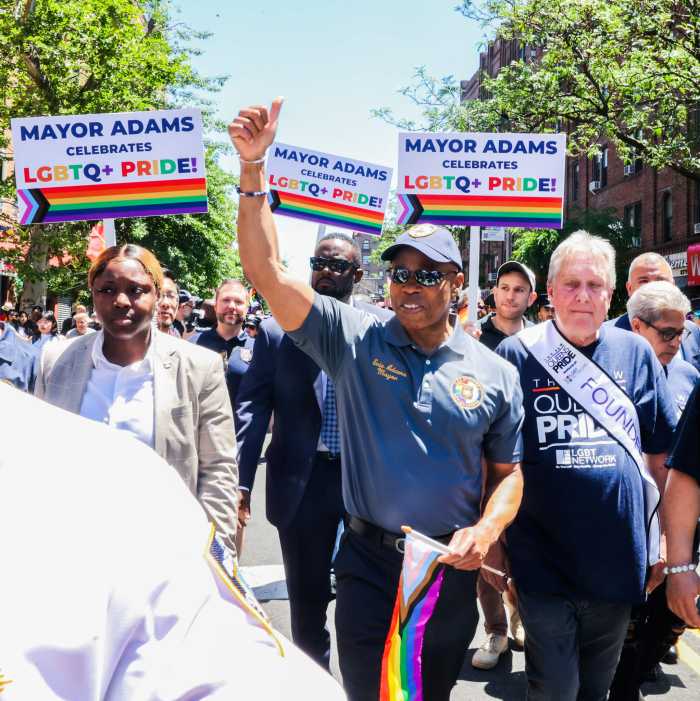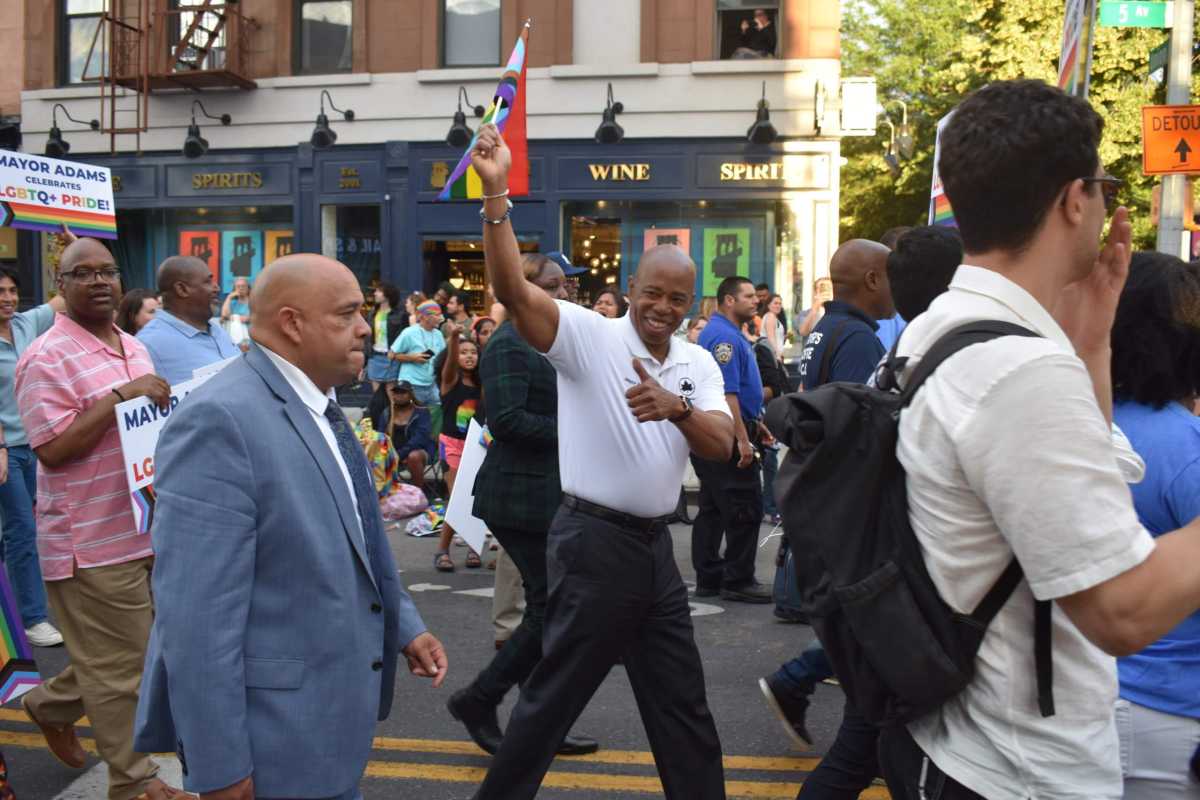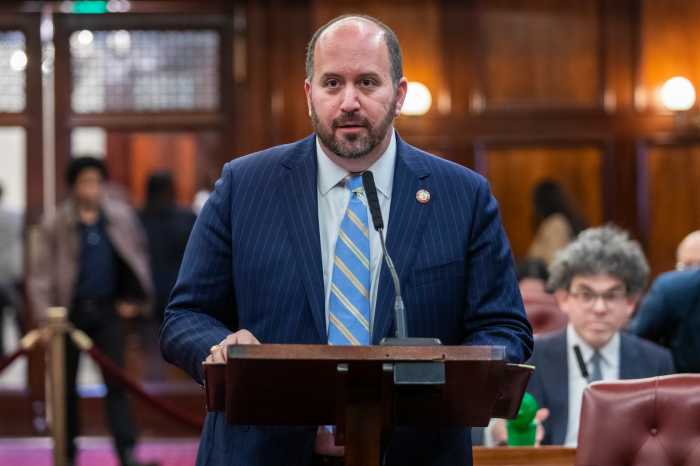The 56th anniversary of the Stonewall Uprising is just days away, but this year’s Pride festivities are marching in against the backdrop of a transphobic political landscape and a broader backlash against the LGBTQ community.
The disturbing cultural climate has translated into a nearly $1 million budget deficit for NYC Pride, which recently announced some high-profile sponsors have “pulled back, scaled back funding, or reallocated it in a different way” this year, with some former sponsors citing the threat of blowback from the Trump administration.
In a Pride Month interview with Gay City News about a range of topics relevant to the LGBTQ community, Mayor Eric Adams criticized those who are pulling back on NYC Pride, describing the backlash as “unfortunate.”
“Those who are part of the LGBTQ+ community, they’re consumers, they’re shoppers, they’re travelers,” Adams said. “They use their discretionary dollars to patronize some of the places where they have made a decision to pull back. And I think that the communities speak with a loud voice, just as other communities do when they believe they’re treated unfairly, and let individuals know that they’re going to shop with their feet.”
The mayor said he plans to attend the NYC Pride March and some other events marking the anniversary of the Stonewall Uprising. He also hosted his own annual Pride event at Gracie Mansion earlier in the month, drawing hundreds of attendees, though some groups — including the Jim Owles Liberal Democratic Club — boycotted it and criticized the mayor’s record on LGBTQ issues.
Adams, now in the final year of his term in office, has seen his relationship with the LGBTQ community ebb and flow over the course of nearly two decades. During his time in the State Senate, he was widely praised for delivering impactful remarks in the chamber to help usher in marriage equality in New York State — a history-making moment — and he co-sponsored the gender expression non-discrimination act (GENDA), which barred discrimination on the basis of sexual orientation and gender identity, nearly a decade before it was finally signed into law in 2019.
“I have religious beliefs, but when I walk through those doors, my Bible stays out,” Adams said in 2009, according to Gay City News. “You don’t have to be gay to respect that two people who meet and fall in love deserve to be married. You don’t have to be Black to understand the pain of slavery.”

However, shortly after Adams became mayor, his relationship with the LGBTQ community became strained when he appointed three anti-LGBTQ religious leaders to his administration, including the former Bronx Councilmember Fernando Cabrera, who once praised Uganda’s government for rejecting LGBTQ rights when it was considering its notorious “kill the gays” bill (Cabrera has since left the administration). Last year, Adams again faced criticism after his administration proposed a city budget that would have slashed millions of dollars in funding for HIV/AIDS services, though that money was restored after non-profits sounded the alarm about the potential consequences of such cuts.
When asked about criticism over his LGBTQ record, Adams said he is “someone living in the spirit of Harvey Milk” and cited his work on marriage equality and as a police captain patrolling the Christopher Street Pier. He also pointed to his support of GENDA at a time when it was nowhere near the finish line in the State Senate.
“I’m proud of my record,” Adams said. “And if someone wants to rewrite that record that Eric has not been good on these issues, then they need to point where. They need to say, specifically, what has Eric done that he has not been a champion for this community for many years? I go back to my days with GOAL, the Gay Officers Action League, going to precincts and being disruptive at roll calls to fight for gay officers and their right to move forward.”
Adams, who is running for re-election as an independent, further pointed to other areas of progress for the LGBTQ community, including in Staten Island, where the St. Patrick’s Day Parade now allows queer groups to march after previous organizers barred them from participating in the event.
“I have been clearly strong on the issues that impact this community,” Adams insisted.
Among the urgent issues of concern at the moment is the status of gender-affirming care, which has been in limbo since President Donald Trump signed an executive order calling to bar such care for individuals 19 years of age or younger. That order prompted multiple New York City-based private hospitals to pull back or withhold care, fueling lawsuits, warnings from Attorney General Letitia James, and a drawn-out legal battle.

When asked about the executive order and the hospitals’ response to that order, Adams first emphasized that “I don’t speak for the federal government in spite of what people believe — [like] I’m the VP or some sort,” and said he speaks only for New York City.
“New York has been in support of gender-affirming care and we will always stand up for the transgender and non-binary communities,” Adams said. “I’m going to continue to fight and raise my voice, and we’re going to continue to do the right thing.”
Some political leaders — including some candidates in the New York City mayoral race as well as sitting elected officials in the city — are scrambling to search for contingency plans for gender-affirming care. Legislation carried by State Sen. Kristen Gonzalez and out Assemblymember Jessica González-Rojas calls to establish a gender-affirming care fund and program to support and increase access to gender-affirming care in the state.
While the proposal is under consideration at the state level, Adams is receptive to the idea, saying it is “definitely something we’d look into on how to accomplish the task,” though he raised questions about how to fund it.
“In government, you’ll find that those who don’t control the purse would throw out agendas that cost money and don’t know where it’s going to come from,” Adams said. “We’re going to look at any way to offset any cuts that are impacting the community.”

On the topic of HIV/AIDS, the mayor alluded to last year’s budget fight to restore funding and cast blame on what he described as “the large amount of money that Washington did not reimburse us due to the migrant asylum seeker crisis.” But he emphasized that, in the end, the funding was restored.
“We found ways to make sure that we go after those areas of high need, and we want to continue to do so,” he said.
The city and state have made progress over time in the fight against HIV/AIDS, but disparities have lingered. In 2022, for example, HIV diagnoses among non-Hispanic Black and Hispanic individuals in New York State were 7.6 and 4.8 times higher, respectively, than for non-Hispanic white individuals, and there are ongoing racial disparities in terms of who uses the HIV prevention medication known as PrEP.
Adams, citing groups like Brooklyn Pride, said one way to address those disparities is to work with organizations on the ground in the community.
“We want to partner with them to make sure we get into the crevices of these communities and get information and communicate in a manner that people feel comfortable to share what resources they believe are needed at the time,” Adams said. “And then we have to do it in multiple languages.”
The interview with Adams also touched on some other topics, including the recent sentencing of several men who were found guilty for their role in a fatal drugging and robbery scheme targeting gay men in nightlife spaces. The emergence of those cases prompted the Adams administration to launch an initiative in 2023 to allow individuals to ask the police to re-evaluate unsolved cases — including decades-old cold cases — involving LGBTQ victims.
“I remember in the ’80s and the ’90s being a police officer — and even in the 2000s — when I was in the Sixth Precinct, and some of the bias I saw in the law enforcement officers,” Adams said. “Some of these cases have not come to a resolution because the people who have knowledge and information have not come forward. It’s not due to the lack of desire to do so, but we have to make sure that every hate crime is investigated and receives the same level of attention that we would do in any crime that takes place in the city.”
That same year, Adams used his State of the City address to announce a separate new initiative to incorporate an LGBTQ component to the city’s Summer Youth Employment Program. Known as Summer Youth Employment Pride, the six-week career exploration program drew 3,500 participants in its first year.
“We wanted to identify members of the community for summer youth employment, and we’ve done an excellent job in doing so,” said Adams, who added that the city “intentionally targeted” LGBTQ youth to “get them engaged in summer youth employment.”
“That is one of the things that we’ve done that I’m extremely proud of because we didn’t ignore the fact that there needed to be a special level of outreach to the community,” he said.



































